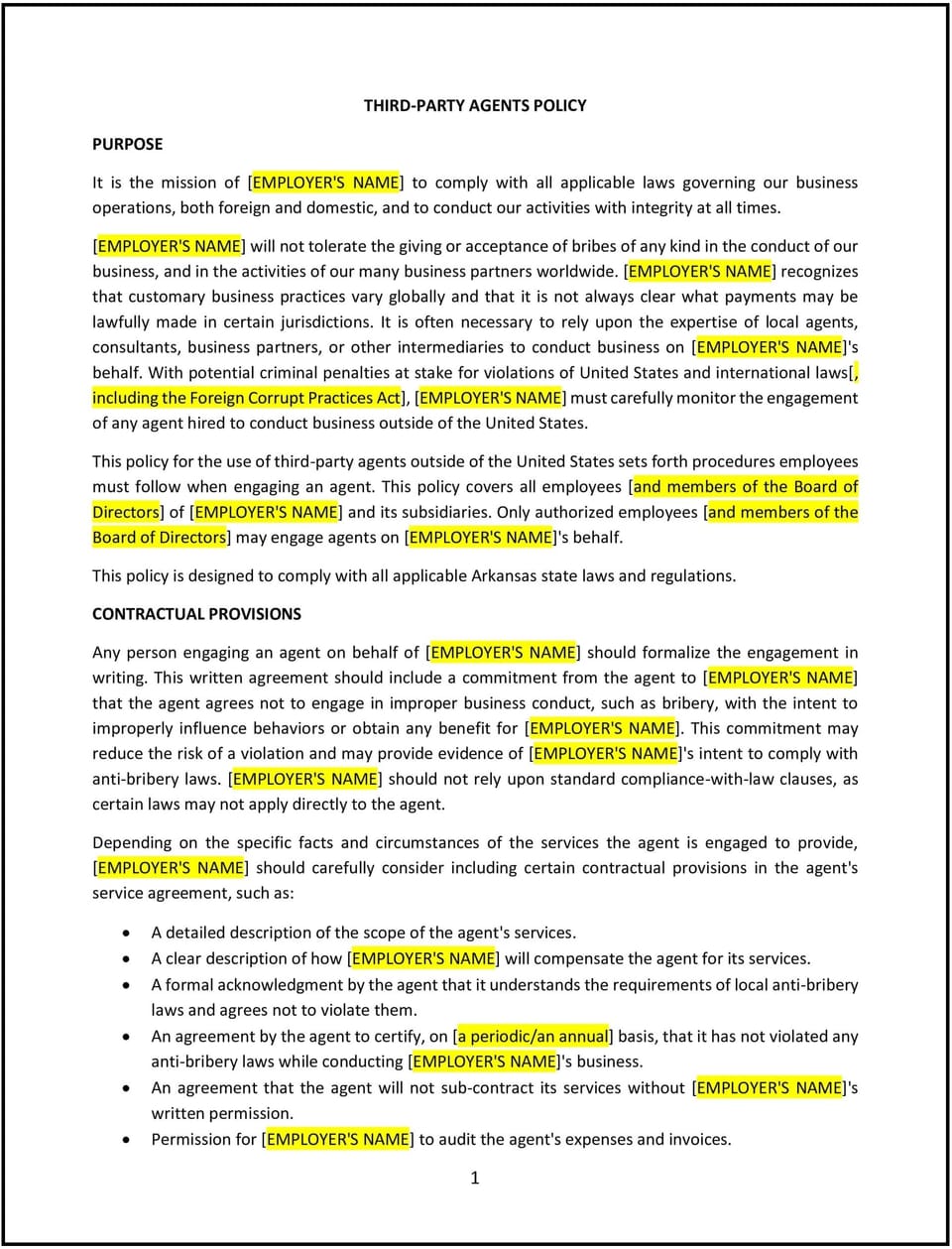Third-party agents policy (Arkansas): Free template

Third-party agents policy (Arkansas)
In Arkansas, a third-party agents policy provides businesses with guidelines for managing relationships with external agents, contractors, or representatives. This policy ensures that third parties acting on behalf of the business adhere to ethical standards, legal requirements, and contractual obligations.
This policy outlines the selection, onboarding, and monitoring processes for third-party agents, helping Arkansas businesses protect their reputation, maintain operational consistency, and support compliance with applicable state and federal laws.
How to use this third-party agents policy (Arkansas)
- Define roles and responsibilities: Clearly specify the scope of work, authority, and limitations for third-party agents acting on behalf of the business.
- Outline selection criteria: Establish standards for vetting and selecting third-party agents to ensure alignment with the business’s values and legal requirements.
- Communicate expectations: Provide third-party agents with guidelines on ethical practices, reporting requirements, and compliance with business policies.
- Monitor performance: Implement procedures for regularly reviewing third-party activities to ensure they meet contractual and legal obligations.
- Address violations: Specify the steps the business will take to address breaches of the policy or agreements by third-party agents.
Benefits of using this third-party agents policy (Arkansas)
This policy offers several advantages for Arkansas businesses:
- Protects business interests: Ensures third-party agents act in alignment with the business’s standards and objectives.
- Supports compliance: Aligns with Arkansas laws and federal regulations governing third-party relationships and activities.
- Reduces risks: Mitigates potential legal, financial, or reputational risks associated with third-party misconduct or non-compliance.
- Enhances accountability: Provides a structured framework for selecting, onboarding, and monitoring third-party agents.
- Builds trust: Promotes transparency and professionalism in third-party relationships, enhancing stakeholder confidence.
Tips for using this third-party agents policy (Arkansas)
- Address Arkansas-specific considerations: Ensure the policy complies with state laws governing contracts, business practices, and third-party relationships.
- Vet thoroughly: Conduct background checks and due diligence before engaging third-party agents to ensure their qualifications and reputation.
- Use clear contracts: Develop detailed agreements outlining the roles, responsibilities, and compliance obligations of third-party agents.
- Monitor activities: Regularly review the performance and compliance of third-party agents through audits or performance evaluations.
- Update as needed: Revise the policy to reflect changes in laws, business practices, or industry standards.
Q: How does this policy benefit the business?
A: This policy ensures third-party agents align with the business’s standards, reduces risks of non-compliance, and supports accountability in external relationships.
Q: What criteria should the business use to select third-party agents?
A: The business should evaluate qualifications, reputation, financial stability, and alignment with ethical and legal standards.
Q: How does this policy support compliance with Arkansas laws?
A: The policy includes best practices to ensure third-party activities adhere to state and federal regulations, reducing potential legal risks.
Q: What steps should the business take to monitor third-party agents?
A: The business should conduct regular reviews, audits, and performance evaluations to ensure agents meet their contractual and compliance obligations.
Q: How should the business handle policy violations by third-party agents?
A: The business should investigate breaches, document findings, and take corrective actions such as contract termination or legal measures as outlined in the policy.
This article contains general legal information and does not contain legal advice. Cobrief is not a law firm or a substitute for an attorney or law firm. The law is complex and changes often. For legal advice, please ask a lawyer.


